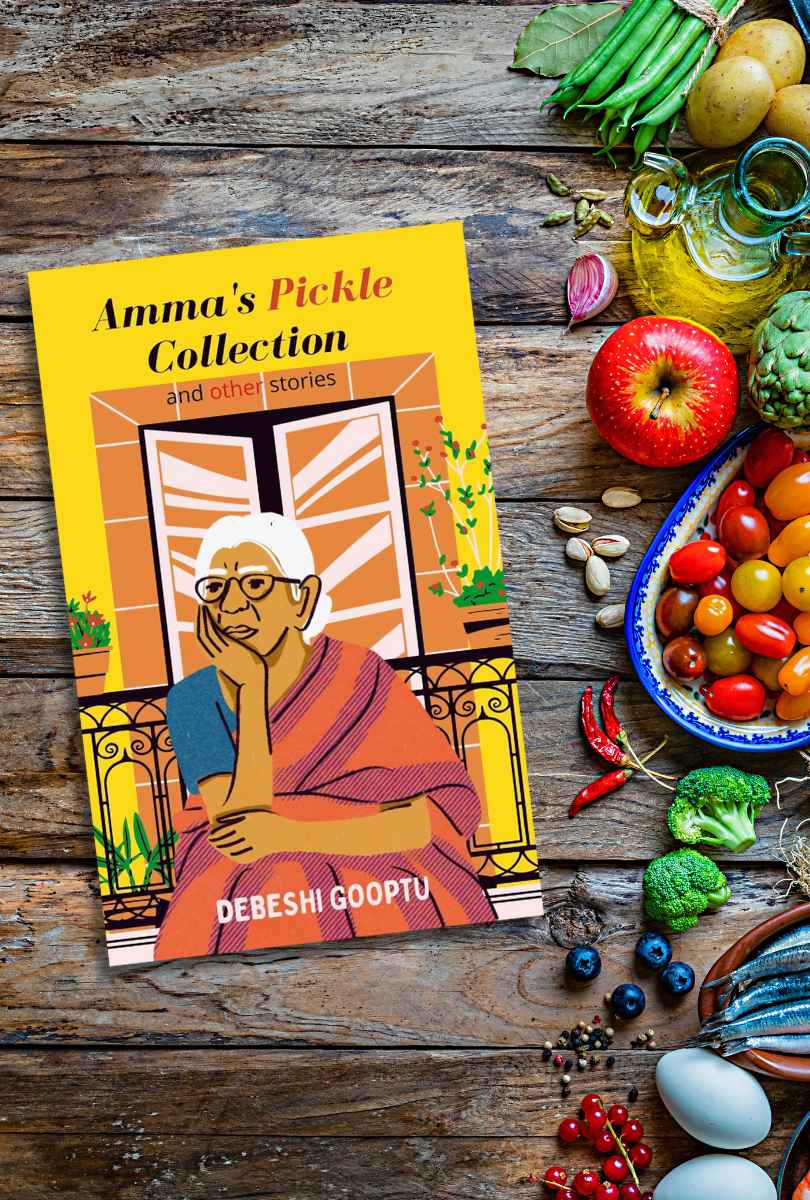STORIES: 3.5/5 THEME: 4.5/5 WRITING: 3/5 OVERALL: 3.5/5 Themes: Short Stories, Fiction, Everyday Life, Tales of Ordinary People
“Beside the pickles, her daughter-in-law’s elaborate flower display drooped under the glare of the sun – brightly coloured begonias, hyacinths and pansies in expensive planters bought from the boutique at the mall. Her lips curled back in a sneer as she stared at the wilting flowers. All this trouble to beautify the balcony when the two hardly spent any time in the house.”
– Debeshi Gooptu, Amma’s Pickle Collection and Other Stories
On the lookout for a simple collection of short stories, I stumbled upon Debeshi Gooptu’s Amma’s Pickle Collection and Other Stories. Discovering relatively unknown authors and unravelling hidden gems is one of the many perks and also duties of my profession, not to mention that this act also gives me immense pleasure. There’s something incredibly satisfying about discovering a new voice in the literary world.
Now, I won’t claim that this book ranks among the best Indian short story collections I’ve ever read. But there’s a certain promise in the writing that caught my attention. At the end of the day, I’m just glad to have stumbled upon it.
Honestly, what drew me in was the unassuming cover. It reminded me of the stories penned by Sudha Murty and RK Narayan, two literary giants whose works I deeply admire. With that graceful image of ‘amma’ adorning the cover, it felt like a promise of simpler times, a glimpse into our cherished past. And who doesn’t love a trip down memory lane every now and then?
What is the book all about?
“Amma’s Pickle Collection and Other Stories” is a short collection (less than 50 pages) featuring five short stories that celebrate the most ordinary and humble of Indians. It’s a book that shines a light on the underdogs of society, championing their cause, their struggles, and their everyday lives.
In the titular story, we’re taken on a journey with an elderly grandmother and her deep love for pickles. Confined by the limited space in her son’s city apartment, she takes over the balcony to indulge in her favourite pastime, all the while reminiscing about the simpler times of her youth in the village.
“The Day the Train Stopped” tells the poignant tale of a young mother’s struggle to provide for her child amidst financial hardship. With the father absent and squandering away the day, it’s up to Tapu’s mother to ensure their needs are met, no matter the cost.
“Flowers for the Dead” delves into the life of a disciplined doctor with unwavering professional integrity. Though always meticulous and rule-bound, his world is shaken when an emergency case of a dead wife pops up, and he acts in haste, deciding to help the distraught man who rushed to his clinic seeking immediate help.
Then there’s “Cuckoo,” a story of a man grappling with suspicions of his wife’s unusual behavior. Consumed by doubt and unable to confront her, he seeks solace in an unlikely confidant, leading to a pivotal moment that alters the course of his life.
Finally, “Mother’s Milk” starkly contrasts the lives of the privileged and the underprivileged. It exposes the callousness of the elite who abandon their babies without a second thought, juxtaposed with the desperate struggles of the less fortunate who long for a child of their own.
My review
As mentioned earlier, each of these stories champions the underdogs of society. They’re not packed with many thrills or suspense, nor do they boast intricate plotlines. Yet, somehow, they manage to leave a lasting impact on the reader. It’s their simplicity, their characters, and their relatable, everyday problems that make these stories resonate.
Every tale prompts reflection on the inequalities of the world, highlighting the stark differences between people who live side by side every day—be it family members, coworkers, or acquaintances. These stories aren’t necessarily happy ones, but they do offer a brief yet captivating glimpse into human lives.
They inspire you to take a closer look at the ordinary people you encounter daily and uncover their stories. In this regard, the writing reminds me of Ruskin Bond, who often drew inspiration from the bustling crowds of India’s vibrant bazaars, roads, and railway stations.
While the writing is commendable, it could benefit from a bit more depth and finesse. It’s not flawless or the best I’ve ever encountered, but it certainly shows promise. With a little refinement, it could truly shine.
Can’t wait to read it? Buy your copy of “Amma’s Pickle Collection and Other Stories” right away!
